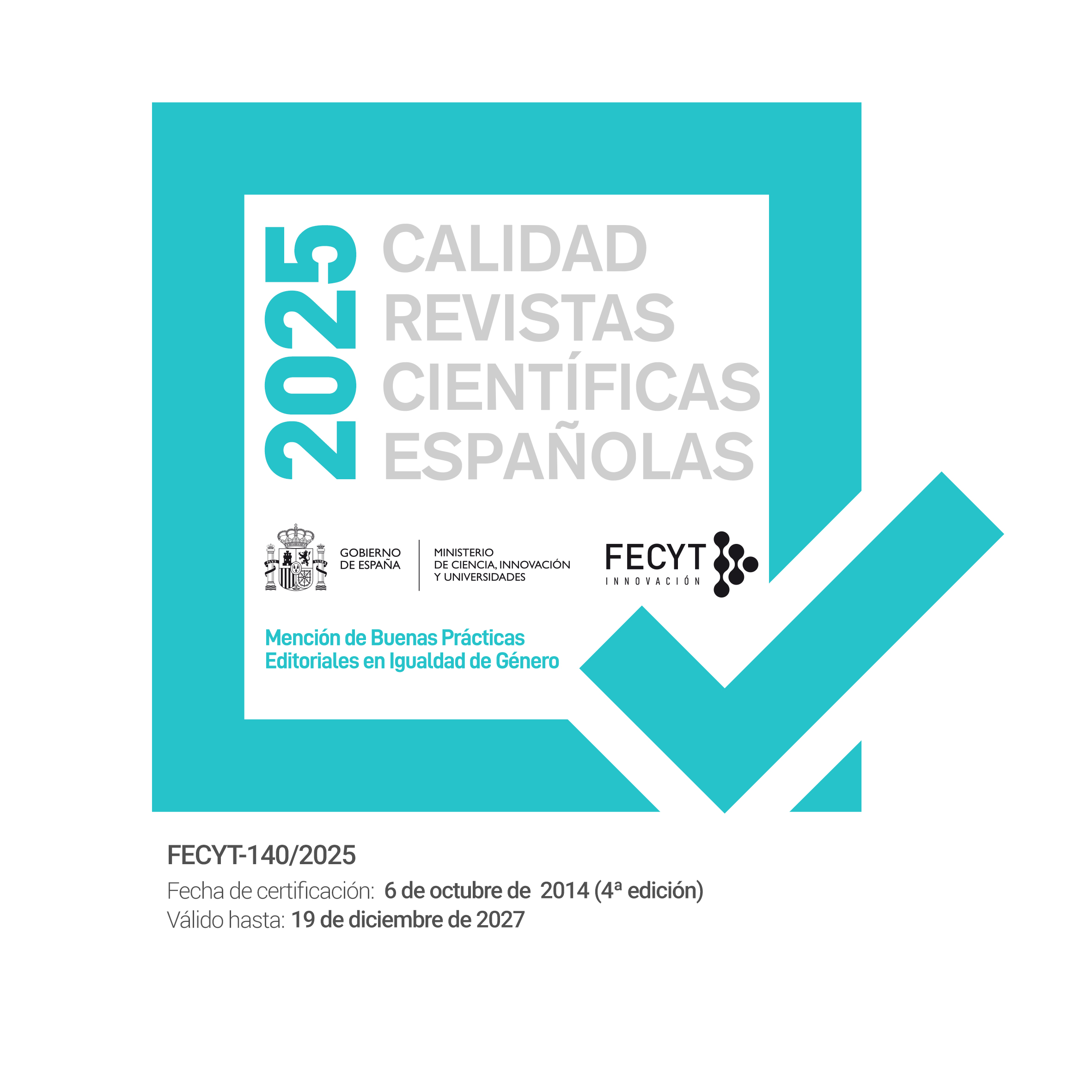The Dispositions for Culturally Responsive Pedagogy Scale (DCRPS): validación psicométrica y resultados en el profesorado español
DOI:
https://doi.org/10.5944/educxx1.39851Palabras clave:
educación culturalmente receptiva, evaluación del docente, formación docente, educación multicultural, validaciónResumen
Las aulas educativas son un fiel reflejo de las sociedades cada vez más diversas y desiguales, es por ello que el profesorado precisa de una determinada disposición docente hacia sus estudiantes y su enseñanza que garantice una mayor justicia social. Este artículo describe una investigación instrumental centrada en la adaptación y validación en población española de la Disposition for Culturally Responsive Pedagogy Scale (Whitaker & Valtierra, 2018). El objetivo principal es analizar las características psicométricas de esta escala, que evalúa la disposición docente hacia la Educación Culturalmente Receptiva (ECR). No se conocen o no hemos hallado instrumentos específicos en castellano que analicen la disposición docente hacia esta pedagogía. Se ha utilizado una metodología de corte cuantitativo por medio de un método de encuestas administradas a profesores de diferentes niveles educativos y regiones de España (N = 538). El análisis factorial confirmatorio reveló un ajuste óptimo para una estructura de tres factores: praxis educativa, comunidad y justicia social, tras eliminar dos ítems originales. Los resultados del análisis de fiabilidad indican una consistencia interna adecuada, con índices de Alfa de Cronbach (α = .942) y Omega de McDonald (ω = .943) satisfactorios. Además, se encontraron diferencias estadísticamente significativas respecto a las disposiciones hacia la ECR según el sexo, nivel educativo y especialidad del profesorado, lo que sugiere la relevancia de considerar estas variables al evaluar la disposición docente hacia la ECR en diferentes contextos educativos. En conclusión, el estudio proporciona una primera herramienta válida y fiable para conocer la disposición del profesorado hacia la ECR, contribuyendo así a la mejora de una educación más inclusiva y equitativa.
Descargas
Citas
Abacioglu, C. S., Fischer, A. H., & Volman, M. (2022). Professional development in multicultural education: What can we learn from the Australian context?. Teaching and Teacher Education, 114, 103701. https://doi.org/10.1016/j.tate.2022.103701
Adam, H & Byrne, M (2024). ‘I’m not from a country, I’m from Australia.’ Costumes, scarves, and fruit on their heads: The urgent need for Culturally Responsive Pedagogy when sharing diverse books with children. Australian Educational Researcher. 51, 1121-1140. https://doi.org/10.1007/s13384-023-00631-x
Anlimachie, M. A., Abreh, M. K., Acheampong, D. Y., Samuel, B., Alluake, S., & Newman, D. (2023). Enacting culturally responsive pedagogy for rural schooling in Ghana: A school-community-based enquiry. Pedagogy, Culture & Society, 11(1). https://doi.org/10.1080/14681366.2023.2205861
Anyichie, A. C., Butler, D. L., Perry, N. E., & Nashon, S. M. (2023). Examining classroom contexts in support of culturally diverse learners’ engagement: An integration of self-regulated learning and culturally responsive pedagogical practices. Frontline Learning Research, 11(1), 1–39. https://doi.org/10.14786/flr.v11i1.1115
Arques, E. M., & Navas, L. (2010). Unos instrumentos para evaluar las actitudes hacia la inmigración de los estudiantes de Magisterio: cualidades psicométricas. International Journal of Developmental and Educational Psychology, 3(1), 515-524. https://www.redalyc.org/articulo.oa?id=349832326056
Ato, M., López, J. J., & Benavente, A. (2013). Un sistema de clasificación de los diseños de investigación en psicología. Anales de Psicología, 29(3), 1038-1059. https://doi.org/10.6018/analesps.29.3.178511
Bayona-i-Carrasco, J., Domingo, A., & Menacho, T. (2020). Trayectorias migratorias y fracaso escolar de los alumnos inmigrados y descendientes de migrantes en Cataluña. Revista Internacional de Sociología, 78(1), e150. https://doi.org/10.3989/ris.2020.78.1.18.107
Cabrera-Vázquez, A. Romera, E. M., Ortega-Ruiz, R., Gil, C., & Falla, D. (2022). Desconexión moral cívica, empatía y actitudes de futuros docentes hacia la diversidad cultural. Aula abierta, 51(3), 285-292. https://doi.org/10.17811/rifie.51.3.2022.285-292
Casebeer, D. (2016). Mapping dispositions for social justice: towards a cartography of reflection. Reflective Practice, 17(3), 357–368. https://doi.org/10.1080/14623943.2016.1164685
Comstock, M., Litke, E., Hill, K. L., & Desimone, L. M. (2023). A Culturally Responsive Disposition: How Professional Learning and Teachers’ Beliefs About and Self-Efficacy for Culturally Responsive Teaching Relate to Instruction. AERA Open, 9. https://doi.org/10.1177/23328584221140092
Chang, W.-C., & Cochran-Smith, M. (2022). Learning to teach for equity, social justice, and/or diversity: Do the measures measure up? Journal of Teacher Education. https://doi.org/10.1177/00224871221075284
Chuang, H.‐H., Shih, C.‐L., & Cheng, M.‐M. (2020). Teachers’ perceptions of culturally responsive teaching in technology‐supported learning environments. British Journal of Educational Technology, 51(6), 2442–2460. https://doi.org/10.1111/bjet.12921
Delbury, P. (2020). ¿Racial Discrimination in Inclusive Education? A perspective from critical interculturality. Revista Electrónica Educare, 24(1), 1-15. https://doi.org/10.15359/ree.24-1.22
Diez, M. (2007). Looking back and moving forward: Three tensions in the teacher dispositions discourse. Journal of Teacher Education, 58, 388–396. https://doi.org/10.1177/0022487107308418
Fallon, L. M., DeFouw, E. R., Cathcart, S. C., Berkman, T. S., O’Keeffe, B. V., & Sugai, G. (2021). Supports to improve academic outcomes with racially and ethnically minoritized youth: A review of research. Remedial and Special Education, 43(4), 237–254. https://doi.org/10.1177/07419325211046760
Freire, P. (1970). Pedagogía del oprimido. Siglo XXI.
Garson, G. D. (2002). Guide to writing empirical papers, theses, and dissertations. CRC Press.
Gatignon, H. (2013). Statistical analysis of management data (3rd ed.). Springer. https://doi.org/10.1007/978-1-4614-8594-0
Gay, G. (2010). Culturally responsive teaching: Theory, practice and Research (2nd ed.). Teachers College Press.
Gay, G. (2013). Teaching to and through cultural diversity. Curriculum Inquiry, 43(1), 48–70. https://doi.org/10.1111/curi.12002
Herrero, J. (2010). El Análisis Factorial Confirmatorio en el estudio de la Estructura y Estabilidad de los Instrumentos de Evaluación: Un ejemplo con el Cuestionario de Autoestima CA-14. Psychosocial Intervention, 19(3), 289-300.
Hu, L. T., & Bentler, P. M. (1999). Cutoff criteria for fit indexes in covariance structure analysis: Conventional criteria versus new alternatives. Structural Equation Modeling, 6(1), 1-55. https://doi.org/10.1080/10705519909540118
Kline, P. (2014). An easy guide to factor analysis. Routledge.
Kruger, M. (2019). The development and validation of a self-report instrument to assess attitudes and self-efficacy of preservice teachers toward teaching linguistically and culturally diverse PE classes. Measurement in Physical Education and Exercise Science, 23(1), 28–38. https://doi.org/10.1080/1091367X.2018.1483375
Ladson-Billings, G (1995). Toward a theory of culturally relevant pedagogy. American Educational Research Journal, 32(3), 465-491. https://doi.org/10.3102/00028312032003465
Lambert, L. S., & Newman, D. A. (2023). Construct Development and Validation in Three Practical Steps: Recommendations for Reviewers, Editors, and Authors. Organizational Research Methods, 26(4), 574-607. https://doi.org/10.1177/10944281221115374
Ledezma Vargas, D., & Hernández Vigorena, K. (2023). ¿Existen relaciones entre las actitudes de los profesores hacia la multiculturalidad y sus prácticas pedagógicas en el aula? Revista INTEREDU, 1(8), 124-153. https://doi.org/10.32735/S2735-6523202300083062
Lloret-Segura, S., Ferreres-Traver, A., Hernández-Baeza, A., & Tomás-Marco, I. (2014). El análisis factorial exploratorio de los ítems: Una guía práctica, revisada y actualizada. Anales de Psicología, 30(3), 1151-1169. https://doi.org/10.6018/analesps.30.3.199361
Llorent, V. & Álamo, M. (2016). Escala de Actitudes hacia la Diversidad Cultural (ADC) para los futuros docentes. Opción, 32(11), 832-841. http://hdl.handle.net/10396/14962
Llorent, V. J., & Álamo, M. (2019). La formación inicial del profesorado en las actitudes hacia la diversidad cultural. Validación de una escala. Papeles de Población, 25(99), 187-208. https://bit.ly/3x94Pey
Llorente Villasante, A., Orozco Gómez, M. L., & Sanz Leal, M. (2024). La educación culturalmente receptiva: análisis educativo del tercer espacio. Teoría De La Educación. Revista Interuniversitaria, 36(1), 73–93. https://doi.org/10.14201/teri.31408
Ministerio de Educación y Formación Profesional (2023). Datos y cifras. Curso escolar 2023-24. Secretaria general técnica. https://www.educacionfpydeportes.gob.es/dam/jcr:27162db1-c2b3-4f9c-a8fa-a17731a561f8/datos-y-cifras-2023-2024-espanol.pdf
OECD. (2018). The Resilience of Students with Immigrant Background: Factors that Shape Well-being. OECD Reviews of Migrant Education, OECD Publishing. https://doi.org/10.1787/9789264292093-en
Paris, D., & Alim, H. S. (2017). Culturally sustaining pedagogies: Teaching and learning for justice in a changing world. Teachers College Press.
Power, M. E., Kelley, M. H., Selders, K. J., & Green, A. L. (2024). Culturally Responsive Evidence-Based Practices for Black Males With Emotional Behavioral Disorders. Intervention in School and Clinic, 59(5), 331-338. https://doi.org/10.1177/10534512231182381
Ramada-Rodilla, J. M., Serra-Pujadas, C., & Delclós-Clanchet, G. L. (2013). Adaptación cultural y validación de cuestionarios de salud: Revisión y recomendaciones metodológicas. Salud Pública de México, 55(1), 57-66. https://doi.org/10.1590/S0036-36342013000100009
Rodríguez, M., Cabrera, F., Espín, J. V., & Marín, M. A. (1997). Elaboración de una escala de actitudes hacia la educación multicultural. Revista de investigación educativa, 15(1), 103-124. http://hdl.handle.net/10201/93384
Seisdedos, N. (2000). Adaptación y tipificación: unos lujos indispensables (Estudio transcultural de los rasgos de personalidad). RIDEP, 10(2), 37-50.
Sockett, H. (2009). Dispositions as virtues: The complexity of the construct. Journal of Teacher Education, 60(3), 291–303. https://doi.org/10.1177/0022487109335189
Stembridge, A. (2020). Culturally responsive education in the classroom: An equity framework for pedagogy. Routledge.
Stephens, K. R. (2019). Teacher Dispositions and Their Impact on Implementation Practices for the Gifted. Gifted Child Today, 42(4), 187-195. https://doi.org/10.1177/1076217519862330
Tabachnick, B. G., & Fidell, L. S. (2001). Using Multivariate Statistics. Allyn and Bacon.
Truscott, D., & Stenhouse, V.L. (2022). A Mixed-Methods Study of Teacher Dispositions and Culturally Relevant Teaching. Urban Education, 57(6), 943-974. https://doi.org/10.1177/0042085918801438
Tualaulelei, E., & Halse, C. (2021). A scoping study of in-service teacher professional development for inter/multicultural education and teaching culturally and linguistically diverse students. Professional Development in Education, 50(5), 847-861. https://doi.org/10.1080/19415257.2021.1973074
Valtierra, K. M., & Whitaker, M. C. (2021). Beliefs or classroom context: What matters most to novice urban teachers’ enactment of culturally responsive pedagogy?. The Urban Review, 53(5), 857-880. https://doi.org/10.1007/s11256-021-00599-x
Vavrus, M. (2008). Culturally responsive teaching. In Good, T.L. (Ed.), 21st century education: A reference handbook, 2, 49-57. Sage Publishing.
Villegas, A. M., & Lucas, T. (2002). Preparing culturally responsive teachers: Rethinking the curriculum. Journal of Teacher Education, 53, 20-32. https://doi.org/10.1177/0022487102053001003
Warren, C. A. (2018). Empathy, Teacher Dispositions, and Preparation for Culturally Responsive Pedagogy. Journal of Teacher Education, 69(2), 169-183. https://doi.org/10.1177/0022487117712487
Watkins, M. W. (2017). The reliability of multidimensional neuropsychological measures: from alpha to omega. Clinical Neuropsychologist, 31(6-7), 1113-1126. https://doi.org/10.1080/13854046.2017.1 317364
Whitaker, M.C. & Valtierra, K.M. (2018a), The dispositions for culturally responsive pedagogy scale. Journal for Multicultural Education, 12(1), 10-24. https://doi.org/10.1108/JME-11-2016-0060
Whitacker, M.C., & Valtierra, K.M. (2018b). Enhancing preservice teachers’ motivation to teach diverse learners. Teaching and teacher education, 73, 171-182 https://doi.org/10.1016/j.tate.2018.04.004
Wronowski, M. L., Aronson, B., Reyes, G., Radina, R., Batchelor, K. E., Banda, R. M., & Rind, G. (2022). Moving toward a Comprehensive Program of Critical Social Justice Teacher Education: A QuantCrit Analysis of Preservice Teachers’ Perceptions of Social Justice Education. The Teacher Educator, 58(2), 217–243. https://doi.org/10.1080/08878730.2022.2122094

Descargas
Archivos adicionales
Publicado
Cómo citar
Número
Sección
Licencia
Derechos de autor 2024 Ángel Llorente-Villasante, Martha Lucía Orozco Gómez

Esta obra está bajo una licencia internacional Creative Commons Atribución-NoComercial 4.0.
La revista Educación XX1 se publica bajo licencia Creative Commons Reconocimiento-NoComerciaL 4.0 (CC BY-NC 4.0). Se permite la generación de obras derivadas siempre que no se haga un uso comercial. Tampoco se puede utilizar la obra original con finalidades comerciales.










